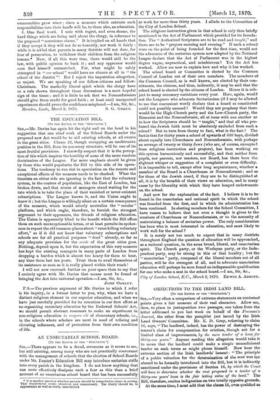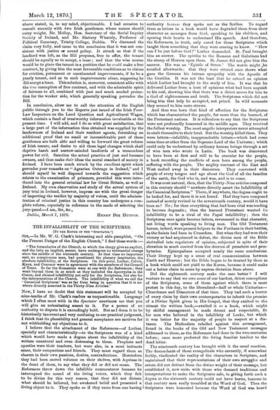OBJECTIONS TO THE IRISH LAND BILL. .
ITO THB EDITOR OF THE " SPECTATOR:1 Srn,—Very often a comparison of extreme statements on contested points gives a fair measure of their real character. Allow me, then, to place in juxtaposition two passages, one taken from the letter addressed to you last week on behalf of the Freenaan' Journal, the other from the pamphlet just issued by the Irian Land Owners' Committee. Mr. E. D. Gray, referring to claim 16, says, "The landlord, indeed, has the power of destroying the tenant's claim for compensation for eviction, though not for a limited class of improvements, by the mere tender of a lease for- thirty-one years." Anyone reading this allegation would take it to mean that the landlord could make a simple unconditional tender on such terms as might please himself. Now hear the extreme section of the Irish landlords' lament z " The principle of a public valuation for the determination of the sent was too' absurd to be formally introduced into the Bill, but it is indirectly sanctioned under the provisions of Section 16, by which, the Court will have to determine whether the rent proposed in a tender of a thirty-one years' lease it the fair letting value of the land." The Bill, therefore, excites indignation on two totally opposite grounds..
At the same time, I must add that the clause 16, even qualified as.
above stated, is, to my mind, objectionable. I had occasion to consult recently with two Irish gentlemen whose names should carry weight, Mr. Molloy, Hon. Secretary of the Social Inquiry Society of Ireland, and Mr. Slattery Whately, Professor of Political Economy, Trinity College, Dublin. We discussed the claim very fully, and came to the conclusion that it was not con- sistent with justice or sound policy. It struck us that if the landlord was left, as the Bill proposes, free to offer, the tenant should be equally so to accept, a lease ; and that the wise course would be to place the tenant in a position that he could make a free contract, by giving him the most favourable conditions as to claims for eviction, permanent or unexhausted improvements, if he be a yearly tenant, and as to such improvements alone, supposing he did accept a lease. This solution is, moreover, consistent alike with the true conception of free contract, and with the admirable spirit of fairness to all, combined with just and much needed protec- tion for the weaker side, which generally speaking pervades the Bill.
In conclusion, allow me to call the attention of the English public through you to the Reports just issued of the Irish Poor- Law Inspectors on the Land Question and Agricultural Wages, which contain a fund of trustworthy information invaluable at the present time. I will add, and I do so with great satisfaction, that a large part of the information thus obtained was supplied by the landowners of Ireland and their resident agents, furnishing an additional proof that no small or inconsiderable part of these gentlemen are both able and willing to forward the great reform .of Irish tenure, and desire to aid those legal changes which shall deprive harsh and narrow-minded landlords of a tremendous power for evil. Sanction the actual practice of just and humane owners, and thus make their ideas the moral standard of society in Ireland. I have been much struck by the excellent spirit which i►ervades your remarks on " Agrarian Outrage in Ireland," and I should myself be well disposed towards the suggestion which relates to the examination of prisoners, provided this were intro- duced into the general criminal law for Great Britain, as well as Ireland. My own observation and study of the actual system of jury trial in Ireland, however, impress me with the great danger of importing the verdict by majority of voices, until the adminis- tration of criminal justice in this country has undergone a com- plete reform, especially in reference to the mode of selecting the jury-panel.—I am, Sir, &c.,



































 Previous page
Previous page